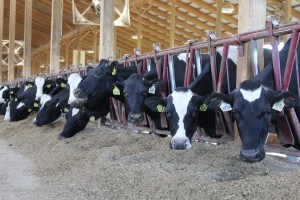
CANAL FULTON, Ohio — The president of the American Farm Bureau Federation toured a wide variety of Ohio farming operations Aug. 23, calling for unity within agriculture.
Zippy Duvall, a Georgia farmer who became president in January, toured a produce and greenhouse operation, a livestock and grain farm, a dairy farm and an agritainment farm.
During a visit to the Clardale dairy farm in Stark County, operated by Ohio Farm Bureau President Frank Burkett and his family, Duvall said farmers need to recognize they’re all part of the same family.
“If we’re (Farm Bureau) going to be the farmers’ voice, then we’ve got to accept that organic, conventional, locally grown — all of agriculture is part of our family,” he said.
Duvall’s own family began in the dairy industry. He was born in Summit County, Ohio, and was in the dairy industry for 30 years. The family eventually moved to Georgia, where they now maintain a 300-head beef cow herd, and finish about 750,000 broilers a year.
With less than three months before the next presidential election, he said Farm Bureau has met with the campaigns for both Donald Trump and Hillary Clinton, and continues to “hammer out” agriculture’s biggest concerns.
Top concerns
A big one is trade. Farm Bureau and the nation’s commodity groups have worked aggressively to design and promote the Transpacific Trade Agreement, or TPP, that would open up new opportunities in Pacific nations, and reportedly give the U.S. farm economy a $4.4 billion boost.
The TPP is supported by President Obama, but both presidential candidates oppose the deal, arguing it will lead to a loss of U.S. jobs, and concerns over the potential for currency manipulation.
Trump has been particularly vocal with his opposition to TPP, calling it a “disaster” and “a rape” of our country.
Organizers of the TPP have worked to include safeguards against job loss, and currency manipulation — but opponents say it’s not enough.
Blanket statements
Duvall said he’s troubled when blanket statements are made about trade, because “it’s so unfair” to all the parties involved.

“We don’t want to kill a trade (deal) that’s been worked on for two years, that we know is a positive thing for agriculture,” he said.
A big issue in northeast Ohio — and for all dairy farms — is the low price for milk. The recent cycle has farmers and policymakers re-evaulating existing safety net programs, and whether those should be increased in the next farm bill.
Duvall said the dairy and cotton programs in the farm bill are not working as intended, and there’s room for improvement. He said Farm Bureau has appointed a workforce of state Farm Bureau employees — to begin the vetting process of what’s on farmers’ minds, and what the next farm bill should look like.
New farm bill
He said the workforce is not trying to write policy — but is fielding suggestions. He anticipates “a big-time debate” next year, over the new bill.
One thing he doesn’t support is separating the farm programs from the food and nutrition programs. The food and nutrition programs, including food stamps, make up more than 75 percent of the farm bill, but pairing the two things helps ensure rural and urban support for the overall bill.
“They (food and farming) were put together years and years ago for a reason — that reason still exists today,” Duvall said.
Burkett, who dairy farms with his uncles and their family, said it appears the risk management level in the current farm bill is not what it needs to be — based on the low-market cycle farmers currently face.
Broader impact
He said when the dairy farmer is hurting, so does all the jobs and economic activity the farmer supports.
“It’s the vendors we deal with, the equipment dealers, the contractors … it has a high multiplication factor of what it does in the surrounding communities,” Burkett said.
Other top issues include farm labor and immigration, and how to attract and keep the next generation.
The nation has been in a years-long battle over what to do about foreign workers, and the 11 million immigrants who are reportedly here illegally. Farmers need help, but say current foreign worker programs, like the H-2A Visa Program, are inefficient.
Duvall said Farm Bureau has told the Trump team that Farm Bureau does not believe in amnesty, but farmers “do believe in an adjustment of status and leaving skilled workers here to work,” so long as they pay their taxes, follow the laws and other civil duties.
Duvall said he does expect immigration reform during the next presidency — whether it’s through Trump or Clinton.
“The American people have got to make up their minds whether or not we’re going to import our food our import our labor,” Duvall said.
Optimistic future
Duvall said the candidates may represent the far-reaching ends of their respective party, but he’s optimistic about the next few years of agriculture — and working with whoever prevails.
“One’s probably a little more liberal than what we would want as farmers, and the other one maybe a little bit more conservative, but I think there’s going to be a great opportunity within the next administration to be able to answer some of those questions,” he said.
In addition to Clardale Farms, other farms on the tour included K.W. Zellers of Hartville, Boyert’s Greenhouse and Farm of Medina, Hord Family Farms of Bucyrus, and Leeds Farm, of Ostrander.









